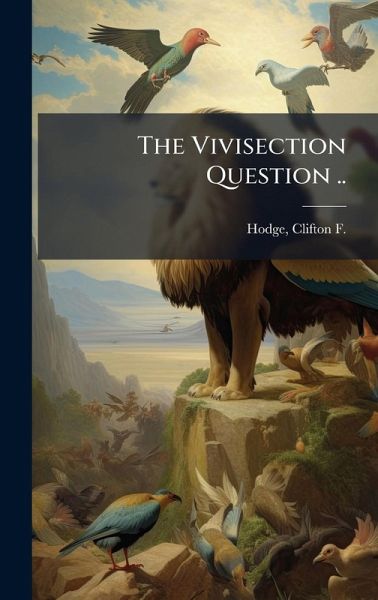
The Vivisection Question ..
Versandkostenfrei!
Versandfertig in über 4 Wochen
25,99 €
inkl. MwSt.

PAYBACK Punkte
13 °P sammeln!
"The Vivisection Question" delves into the controversial practice of animal experimentation during the late 19th century. Written by Clifton F. Hodge, the book presents a comprehensive overview of the arguments for and against vivisection, examining its scientific validity, ethical implications, and social impact. Hodge navigates the complexities surrounding this contentious issue, offering insights into the perspectives of scientists, activists, and the general public. This historical account sheds light on the debates that shaped the animal rights movement and continue to resonate in contemp...
"The Vivisection Question" delves into the controversial practice of animal experimentation during the late 19th century. Written by Clifton F. Hodge, the book presents a comprehensive overview of the arguments for and against vivisection, examining its scientific validity, ethical implications, and social impact. Hodge navigates the complexities surrounding this contentious issue, offering insights into the perspectives of scientists, activists, and the general public. This historical account sheds light on the debates that shaped the animal rights movement and continue to resonate in contemporary discussions about animal welfare and scientific research. "The Vivisection Question" serves as a valuable resource for understanding the historical context of animal experimentation and its lasting legacy. This work has been selected by scholars as being culturally important, and is part of the knowledge base of civilization as we know it. This work was reproduced from the original artifact, and remains as true to the original work as possible. Therefore, you will see the original copyright references, library stamps (as most of these works have been housed in our most important libraries around the world), and other notations in the work. This work is in the public domain in the United States of America, and possibly other nations. Within the United States, you may freely copy and distribute this work, as no entity (individual or corporate) has a copyright on the body of the work. As a reproduction of a historical artifact, this work may contain missing or blurred pages, poor pictures, errant marks, etc. Scholars believe, and we concur, that this work is important enough to be preserved, reproduced, and made generally available to the public. We appreciate your support of the preservation process, and thank you for being an important part of keeping this knowledge alive and relevant.


